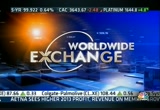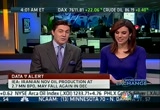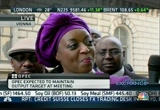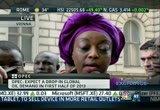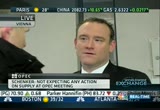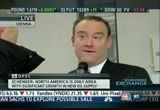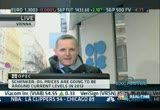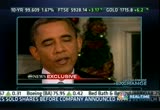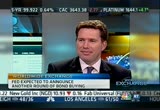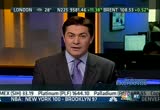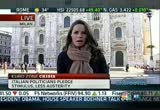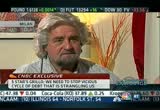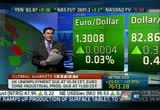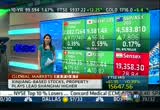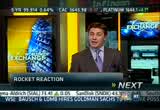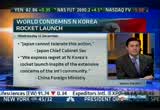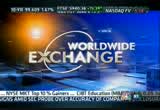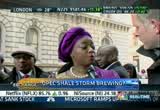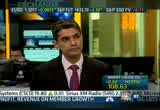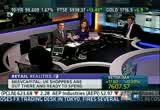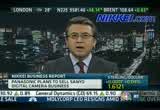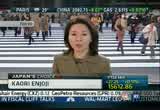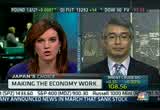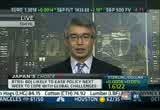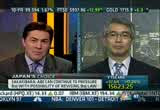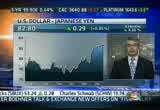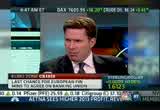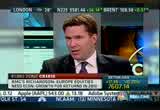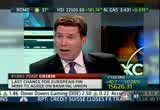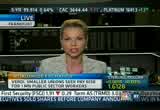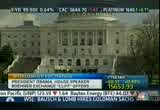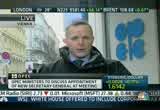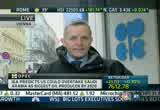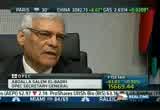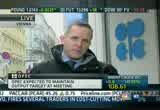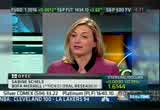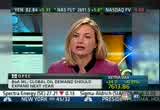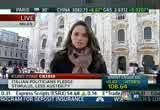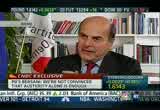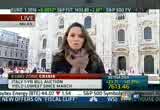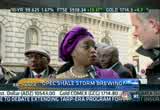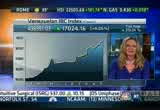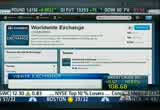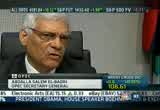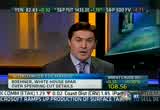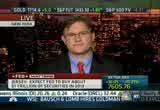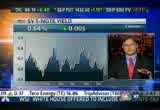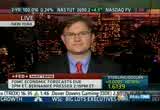tv Worldwide Exchange CNBC December 12, 2012 4:00am-6:00am EST
4:00 am
hello, this is today's "worldwide exchange." i'm ross westgate. >> i'm kelly evans. these are your headlines from around the world -- >> opec ministers expect to agree on keeping their output target. talks about the level of u.s. production, rivalries between iran and saudi arabia, and a new secretary general could get heated. italy likely to see a strong
4:01 am
uptai uptake thanks to supply reductions before year end. and let's twist again. the fed set to announce a fresh around of bond purchases to match the outgoing twist program at the end of the year. the international community blasts north korea after it successfully launches a long-range rocket, prompting an emergency u.n. security council meeting. all right. a very good morning to you. we are going to be on to opec later. we've got the latest i.a. data out this morning. they're saying global oil demand projected around 90.5 million barrels a day. more than forecast. they say non-opec production bouncing back. an something bit. they're saying opec crude supply inched up in november led by higher output from saudi arabia. >> i think we'll have to call this today the case of the two
4:02 am
oil reports. we have the opec report that they put out ahead of the meeting showing different figures from what the iea is saying. >> they're saying saudi arabia figures saying we produce less. now the i.a. saying they produce more. also interesting, they're saying in iran, iranian production edging lower under the weight of shipping constraints have stepped up. we heard it was up. go figure the oil markets and production levels. a murky world. opec ministers are arriving as we speak for the annual meeting. the 12-member group widely expected to maintain current output targets. >> steve sedgwick has the latest and joins us now. hi, steve. >> i like that shuffle, steve. that was good. >> reporter: i've got a treat for you. guys, kelly, ross, i've got a treat. the nigerian oil minister has asked me kindly to join -- you are absolutely freezing. thank you very much for joining us. i know you've got a very important meeting coming up. how do you feel about world oil
4:03 am
supplies at the moment? >> well, i think right now we're holding fairly stable. we're of course concerned that there will be a certain level of overproduction over the next 18 months or so if the production continues. >> reporter: saudi arabia need to take oil off the table cd iraq? >> i think those are issues we'll discuss today. >> reporter: what is the most contentious issue? we have been saying the most contentious issue could surround saudi arabia and iran. some estimates of over one million barrels a day. >> again, i would not preempt this meeting and outcome by giving statistics at this point. i think it's critical that we go in and have discussions amongst ourselves and come to the sort of prudent realization of where we go from here. >> reporter: the i.a. stats talk about opec ministers putting a significant amount of oil on to the market in november. and yet, the opec stats
4:04 am
themselves and saudi stats themselves say the usda -- that saudi arabia is taking oil off the table. what's the truth? >> again, it would be most improper me to talk about a fellow colleague's country at this point. >> reporter: one last comment. what about the secretary general? would you like to see him continue? >> he's been a very, very good secretary general. however, again, these are issues that we have to determine. >> reporter: you are so kind. it's absolutely freezing. see you soon. thank you very much, indeed. that was the nigerian oil minister. i think she has a scoop. she hasn't talked to anyone, no one's talking before the meeting. worldwide@cnbc.c our guest is the president of the prestige economics. jason, thank you very much for stepping aside for an oil minister. i think you understand. is saudi taking oil off the table, or are supplies growing
4:05 am
as the i.a. data might imply? >> i think the situation is you have a well-psupplied market. oced demand is continuing to fall. the story of rising/emerging market, demand for transportation fuels, that story's going to go on. i think the saudis are going to remain responsive if we see a slowdown. >> reporter: we have a huge american audience. what's the story, supply at 15-year highs, 20-year highs have been touted for 2013. i know at our chat last night at the hotel that you have question marks about the energy security story in the states. >> you know, that's right. i think we are seeing supplies go up. north america, united states, canada, mexico, they've seen significant growth in oil
4:06 am
supplies. this year one of the few areas, next year, for a few years to come. is it something that it creates supplies to flood the world's market? no. it's going to create supplies that the world market needs. if you think about the low level of automotive transportation, penetration and emerging markets, again, this longer term story, you'll add more oil coming out of the u.s. you get more demand coming. we're going to need every barrel. >> reporter: where is the price going in 2013? >> i think we'll be higher for brent, quite a bit higher for wti. and that's because we're going to see the narrowing of that brent/wti spread as the seaway pipeline comes on line. and those barrels start flowing at a cushion to the gulf. >> reporter: one last question. the fiscal cliff, we talk about it, historical, dollar down, commodities up. i see less bang for the buck on commodities, the more q.e. into the system. i'm not sure it's working. >> i think if we get more q.e., and we're likely to get more today which is qe3 part two or
4:07 am
qe4, however you phrase it, the fed will announce additional purchases and treasuries, i think that is -- the fiscal cliff is a different situation. i think they'll resolve it at the last minute partially in a temporary short-term way so we don't go into a major recession next year. but i think that things are going to be positive. >> reporter: i know you don't think it's complimentary to say you're like a linebacker, but i'm going to need you in a minute. the media scram is vicious. not only do we have the president of prestige economics, we had a first on cnbc, a coup, my jeer nigerian oil minister, back to you. >> you're staying at the intercontinental, things are looking up. >> reporter: what have i done right? i thought those were the good old days of gone. >> they're coming back clearly. another indicator. maybe things are not so bad. >> great stuff. we appreciate the information before the meeting. it will be a scrum later. >> he's good at scrum, though. >> that's why we sent him there. >> yeah.
4:08 am
coming up in the program, spain's biggest export. an analyst who says shoppers are ready to spend. and the vice president hugo chavez's cancer operation that was successful. heel be in miami to speak -- we'll be in miami to speak to an an lifted who talks about the transition of power. plus, joined in studio by the ceo of japanese merchandising giant sanrio. what will the man in charge of -- yes -- hello kitty have to say about holiday spending? that's at 5:20 eastern. 11:20 central/european time. u.s. budget talks have intensified. president obama and house speaker john boehner spoke by phone tuesday after exchanging new proposals. aides confirm the president gave boehner a revised offer on monday, reducing demand for new tax revenue from $1.6 trillion to $1.4 trillion over the next decade. boehner responded with a plan that largely sticks by his original offer a week ago. reports say the white house has told republicans it would include an overhaul of corporate taxes in any budget deal which
4:09 am
it hasn't put on the table before. in an interview with abc news, president obama says he still expects a deal before the end of the year. >> i remain optimistic that there are enough people of goodwill who recognize the economy will be better off. american families will be better off if we get this done. the most important thing we can do is make sure that middle-class taxes do not go up on january 1. i'm confident that republicans would not hold middle-class taxes hostage to try to protect tax cuts for high income individuals. >> you see president obama's full interview with barbara walters friday on "20/20." boehner is demanding more details on spending cuts. the administration has made expensive proposals to reduce spending, but the republicans haven't offered specifics on revenue hikes. today the federal reserve
4:10 am
wraps up its two-day meeting with a decision at 12:30 eastern followed by updated economic projections from fomc members at 2:00 p.m. and ben bernanke's press briefing at quarter past. the fed is expected to announce a new round of bond purchases as its latest program, operation twist, is set to expire at the end of the month. cnbc will begin at 12:00 p.m. eastern. joining us is stewart richardson, partner at rpmg. the press conference -- we'll hear a fresh round of stimulus from the fed. how significant would that be? >> in my mind it's not that significant. i think as optics, people think this is another addition to the stimulus. the fact is that the fed for months and months and months when they go out to purchase longer term treasuries, they're trying to reduce the supply of those in the market and effectively swap short dated cash or other securities.
4:11 am
north about 1.25%. whether they're holding reserves or selling the, say, two-year treasury at north of 2 5 basis points, it's effectively the same thing. they're printing 85 million a month and saying we're not doing a twist, we're doing an outright purchase. >> it's different if twist doesn't expand the balance sheet and a new round of stimulus would. if you look at, i think it was citiprojections or someone saying if you take the total effect of the size of the purchases they could do $85 billion in the next year, a 40% annual increase in the size of the balance sheet. in fact, the biggest increase we've seen prior to now on an annualized basis has been 24%. it could make a big impact. >> i think that is right. but you say, okay, what would the new reserves do? are they going to sit in the banking system as previously created reserves currently are, or are the commercial banks going to lend to the real economy to -- to try and get things going. so to us, it's going to create a
4:12 am
lot of headlines. so it's going to be big in terms of the media impact. and maybe the markets, there are people who may get excited. yeah, we've been going up now for three weeks almost in a straight line. to us it's an addition to stimulus but not -- you know, it's a new round of $45 billion per month adding to that announced in september. in addition, but not the great thing that everyone's wanting to make out of it. >> okay. we'll have that decision again later in the program. stuart will stay with us. italy expected to sell 6.5 billion euros. the first time it tapped the market since the prime minister's decision to step down before the end of his original term. yields have been on the rise, but the sale of short-term paper is expected to see borrowing costs compared to a previous auction. we did see actually a nice fall in italian yields down, what, 8.7 basis points yesterday for ten year. carolyn is in milan with the
4:13 am
latest twists and turns of italian stocks. >> reporter: no one's concerned about the 12-month paper auction today. maybe the bigger concern is about tomorrow's three-year paper. again, italy is fully funded for 2012. they're using tomorrow's auction probably to prefund 2013. yes there is concern about the spreads widening and yields going higher toward the beginning of this week. as you said, yields have come back down again. but do we actually care about yields and spreads? that was the big discussion in italy yesterday. berlusconi says spreads, this is really just a scam. monty says we should care about spreads. want to bring in a third opinion. let's talk about bepo grillo, founder of the five-star movement. not a political party but a movement which benefits from voters' disenchantment with mr. berlusconi and mr. monty. he agrees with mr. berlusconi on
4:14 am
one thing. he says spreads are all just based on speculation. >> translator: the spread is completely detached from the real economy. the spread is mental hallucination created by speculation in the banking sector because half of the italian debt is owned by foreign banks. these banks try to get high rate in order to earn more. so we are a victim of banking speculation, of both foreign and domestic banks. we shall detach from the real economy. we need to stop this vicious cycle of debt that is strangling us. >> reporter: many would argue it's the right time for mario monty to leave the political scene. would you agree? >> translator: he needs to disappear. he was, as the americans say, a bluff, a bubble, a bankruptcy
4:15 am
curator. our country went bankrupt last year. half of the debt was in french and german banks. had we gone bankrupt last year, europe would have ended. so they sent in monty to manage the situation in order for the german and french banks to get their money back. the ucb printed out -- ecb print out money used to help our banks but do not use it to finance our businesses. they give it to them buy to see buy back their debt to help french and german banks. that was monty's work. and in the meantime, our debt went up. >> reporter: and by the way, the five-star movement is number two in the polls.
4:16 am
but he's not really a politician. he is a comedian. not kidding. he actually is a comedian. we also managed to catch up with the politician who's more serious about becoming the next prime minister, who has 30% of the votes in the latest polls, his name is mr. bercani. you know him. we'll show you that in the next hour. now it is time for your "global markets report." all right. thank you very much. we are slightly weighted to the upside here. the european equity grind-up rally continues. advances outpaced decliners about 5-4. the dow jones 600, the ftse flat up three points. the dax up 52-week highs. the highest for nearly five years, since january 14, 2008. now xetra dax up. ftse up. and cac 40 up, highest level
4:17 am
since july, 2011. up .5%. yields coming down during the session yesterday. employment numbers out of the u.k. in around 15 minutes or so. we'll keep our eyes on that. yields also -- treasury yields, 1.67%. gild yields, 1.63. and bond yields higher. they got kicked higher in germany post that survey which we broke on the show, as well. as far as the currency market, dollar bit under pressure ahead of the fed. euro/dollar 130.08. we were down late friday and early monday trade, as well. dollar/yen, highs polls suggest mr. erbe will be a clear win in japan. however big will the lead be and what influence tell have on the bank of japan. dollar and yen pressured by more q.e. talk.
4:18 am
and aussillar three-month high. the prospect of q.e. boosting commodityets. canadian doing well. firm at 1.6122. we have more on the asian trading day out of singapore. >> reporter: hi, thank you, ross. most asian markets finished on a bright note. the shanghai composite recouped morning losses in positive territory. property stocks turned higher in the afternoon. stocks also rallied while investors await beijing's detailed plan on urban development. strengthening main line blue chips pushed the hang seng to a 16-month high. developers, industrials, and gaming stocks among the top gamers today. in japan the country's october machinery orders not rebounding as strongly as expected. investors were still in the buying mood ahead of this sunday's election. the nikkei ended near an eight-month closing high with exporters rallying on the weaker
4:19 am
yen. south korea's kospi gained ground despite north korea's rocket launch. automakers in reverse gear. in australia, strethdenning miners was capped by weakness in developers and telecos. closing partially in the green. still in action under pressure, now lower by .2%. back to you. >> thanks for that. catch you later. while many have shrugged off the impact of today's north korean rocket launch, our guest says it is a potential game-changer. find out why when we come back.
4:22 am
at nearly 10:00 in the morning korea time, pyongyang blasted its second long-range rocket claiming to put its first slight into orbit. international backlash followed almost immediately. we have the latest from seoul. >> reporter: hi, ross. this time north korea says the launch was a success and that what it called a satellite had entered its preset orbit. according to south korean officials, the first stage fell into the west sea, and what
4:23 am
appears to be the second stage landed in waters near the philippines. many north korea watchers say it was a desperate move for the young leader, kim jong-un, to consolidate power and make north korea still more relevant to north korea's presidential elections which will be held next wednesday. because the north had announced technical glitches earlier this week and extended the launch window to the 2 th of the -- 29th of the month, the timing caught the world offguard but could not dodge strong criticism. south korea for one lashed out, of course, calling it a violation of u.n. security council resolutions. and china, north korea's long-time ally, also expressed regret launch calling on the state to abide by u.n. resolutions. now u.n. security council diplomats have also set up an emergency meeting today at the request of the u.s. and japan. back to you. >> all right. thanks for that. the senior fellow at the
4:24 am
school of international studies at the technological university. thanks for joining us. what does this test do today? what's the impact on regional securit security? >> short term, i don't think the impact is going to be particularly severe. in some ways it's been priced in. and for once, north korea's rocket actually did what it was supposed to do which is fly south and not pass over any territory. so in that sense, the reaction can be contained. on the other hand, it caught people by surprise. and i think there will be questions ask the about how could the intelligence -- how good the intelligence was in the u.s. and south korea in failing to pick this up. >> how significant is it that this launch appears to be successful where previous others have failed? >> that's a question to ask. in february we had the 40 seconds into the flight and the last rocket prematurely
4:25 am
exploded. now there is a -- a question about whether they've been receiving external guidance from iran, mentioned as one possibility. there have been reports that iranian officials were spotted around the launch site. so that would make sense to me rather than they've just suddenly miraculously reached a whole new technological level. but they've been trying at this for many years. and finally i think they have to come right. it just happens now that they've managed to get all their ducks in a row. >> we've mentioned that the u.n. is going to have a security council meeting over this and over the response. as we've seen with their dealings across, for example, the mideast, there's still a lot of attention when it comes to how the west will interact with the likes of, say, china on the response. what do you expect? what's china's handling of the situation likely to be? >> you're right. china is the key variable within -- for action within the security council. i think we've seen signs from official statements from china
4:26 am
that they've changed their line under ping. they've been kealing on north korea bay name -- calling on north korea by name and calling on security council resolutions. a shift from hu jintao. this is the first crisis under ping's watch. it doesn't make him look good. in that sense there's probably more pressure for china to show a demonstration here to north korea that it's not going to give an open leash. >> briefly, what are the implications for south korean politicians? >> i think that's the most interesting variable of all. we're just a week out from the elections in south korea. there will be a new president. and i think conservative forces are likely to gain. not only in south korea but japan, of course. we've got an election there, too, in just a few days' time. the conservative candidate i think is likely to marginally
4:27 am
gain but that's all she needs because it's a neck-in-neck race. north korea has probably ensured a south korean presidential victory, the irony. >> senior fellow at the ntu. >> fascinating point there. stick around. in just a couple of minutes we'll get u.k. employment data. see jobless claims rising by 7,000 in november. the latest on those figures as soon as we get them. we'll be right back. can i help you? i heard you guys can ship ground for less than the ups store. that's right. i've learned the only way to get a holiday deal is to camp out. you know we've been open all night. is this a trick to get my spot? [ male announcer ] break from the holiday stress. save on ground at fedex of.
4:30 am
those are your headlines. tensions run high at the opec meeting. the eoe says there must be a response to the oil market that's oversupplied: >> we're, of course, concerned that there will be a certain level of overproduction over the next 18 month or so if the production continues. italy likely to see a strong uptick at the first bond auction after mario monti announced his intention to step down. the international community blast north korea after it successfully launches a long-range rocket prompting an emergency u.n. security council meeting.
4:31 am
employment numbers out of the u.k. look strongerment remembe-- stronger. we thought there might be wider unemployment it fall. the claiming count actually down 3,000. the polls forecasting the number of people claiming unemployment benefits to rise. the jobless number down by 82,000 in the last three months through october. the rate 7.8. the employment up by another 40,000 to 29.601 million. the yen another highest on record. still no pressure from wages, average weekly earnings 1.8%. the annual rate, again, weaker than expected. that's weaker than expected, 1.9%. >> the third quarter private sector employment in the u.k. the highest since records began in '99. and public sector employment at its lowest since the first quarter of '02. as long as the private sector's kicking along, that's manageable -- >> public sector employment down
4:32 am
by 24,000. >> yeah. remarkable. you see the austerity measures there. >> another remarkable set of figures -- unemployment from the -- david arcliss from manpower, we heard from him yesterday, said that the u.k. was doing markedly well. we had this fear in october, last month's numbers, that with that big jump in claim account, were we going to see temporary jobs impact the wired numbers. that clear -- wider numbers. that clearly has not fed through. >> there is a but, and the but is it this -- if figures are strong and figures have been stronger than this indicates, that means productivity is lower than what we've estimated. so that the average -- additional worker coming into the work force is not generating additional economy. >> david is saying that the nature of employment has changed. there's a lot more sort of part-time, temporary jobs. let's get reaction from stuart richardson from rmb wealth
4:33 am
management. an extraordinary -- a strong employment picture in the u.k. i wonder whether that has investable connotation or not. >> maybe the one strong area in the u.k. data in the last several months. the way that --'s been consistent. much better than expected. doesn't necessarily tie up with the raw gdp members, vis-a-vis productivity, et cetera what's interesting is you look at the earnings numbers. the fact that average earnings continue to grow less than the rate of inflation is clearly not great for the average consumer. also when you look at the potential impact on gdp, it's notes in he the number of people you -- it's not necessarily the number of people, it's the aggregate income the employed people earn which is going to drive consumption, et cetera. for us it's great to see people employed. however, it doesn't appear to be high income jobs which have been created. therefore, i think the addition to gdp or potential addition is muted. >> the only good news is if --
4:34 am
there may be less people in public sector pay means more people in work. slightly more taxes paid. >> i think it adds up. in terms of government finances, that's a bigger, wider subject that need more time. clearly the employment picture is strong within the u.k. data of late. >> all right. spain's interdex has largely met forecasts. the brand behind a fashion chain boosted by its presence in emerging markets. inditex shares off a bit. joining us, managing director. what do you make of inditex. >> i think with the share price performance you've seen for that, up almost 70%, almost nothing would please the market. the results are a league of its own. 7% like -- remember, the business is still majority in spain, italy, portugal, greece, et cetera. over 50% of sales.
4:35 am
there 7% like for like. margins rising. it is a special company. >> taking a big -- are they taking a chunk of market share, as well? >> absolutely. i think it goes back to the strengths of its model. i think more than anyone else they listen to the consumer. this is fast fashion taken to the extreme. there's something new in the stores every two weeks. there's a reason to keep going every two weeks. they get feedback from the store managers quickly on what's working, what's not working. go back to the production people, say we need this more, we need less of this. >> the supply chain must be -- where are they making this stuff? how are they able to get it into the store so quick three is. >> about half of their production is in spain, portugal, and morocco. that's the secret really. unlike h&m et cetera who gave everything to the far east, inditex is doing quite a lot locally. that is the key challenge for them. as they get bigger and bigger, can they remain as respondive as they are just -- responsive as they are now? >> they have an inadvertent boost in that labor costs are becoming more competitive in countries. while we're facing supply pressures on labor costs, for
4:36 am
example, out of asia, than that's not necessarily the case for europe. >> even the likes of h & m they're bringing back reduction to places like turkey and chain. china is getting expensive. everyone needs to respond faster to the consumer. >> as much as a success story as this is for inditex, what kind of read is it for the consumer more broadly? i think about the big u.k. department store talking about a great sudden. is the strength perhaps -- great saturday. is the strength perhaps of the consumer, whether it's driven by overseas visits, underestimated? >> i think you're talking about the employment figures. if adds up. if you look at the u.k. particularly, shoppers are out there. if you look at the numbers that we've seen, john lewis had extremely strong figures, asos had strong figures in the u.k. car sales are hitting new highs over the last several years. with the likes of the german mark's, the luxury's doing the
4:37 am
best. people are feeling more confident, particularly if they've been in employment for a while. the key thing -- they are shopping for quality. where they actually get value and quality is really -- those companies are doing particularly well. you are being bombarded by macro headlines. they keep telling you things are going to get worse. they are out there. >> john lewis, you suggested that they had benefited from the u.s. -- you know, american tax cut. i.e., amazon not paying enough tax. therefore people were slightly not doing amazon. they were going to john lewis. does that hold water or not? >> i think -- i'd be careful. there's a little bit of p.r. spin. john lewis are doing very well. and no small thanks to the internet. sales up 40%. mind you, they were up 40% a few months ago. there's no real change in trend. what they are trying to do is capture a slice of the headlines by making more people -- >> we heard yesterday, describing cost of coffee as the tax man's favorite coffee chain. did you like that? >> it's great, isn't it? >> at this point do we have to
4:38 am
call the gdp figures into question in the u.k.? >> when -- people have been talking about this for maybe two, three months about the employment data versus productivity and gdp. and something doesn't seem to quite add up. even the bank of england saying, you know, we're not sure how this adds up. we're not sure of what it means for the economy. and when they start saying that, you've got to wonder what the policy response should be if they don't know what the economy's doing. so i think we need more clarity on the numbers. i suspect that the employment data is reasonably good. i think, you know, if you're in a job, are you out there spending. it's not bleak, bleak, bleak in the u.k. economy. what we were looking at is where's the growth going to come from now. >> right. >> also we know that the government's still in an austerity mode. as i said before, the real income growth for the average person in employment is going down. businesses for whatever reason still aren't increasing capex much. and banks here aren't lending. so where's the growth coming from, that's where we begin to see struggle next year. >> where's the beef as they say in the u.s.
4:39 am
founder, managing director of nevcapital. thanks for staying with us. news out of opec. before the start of the meeting in vienna, iran reiterating it would prefer a 28 million barrel-per-day target but will expect the 30 million target that will be unchanged from the last go-round in june. take a look at oil prices. brent crude, up .5%, around the same for light crude. an interesting discussion coming up later in the program about prospects in 2013 for both. in japan, electronics giant pan sonic looking to shed more assets. we have the story in tokyo. >> reporter: that's right, ross. panasonic plans to sell the digital camera business of its sanio electric subsidiary to a japanese investment fund. shares up 7%. the electronics giant mired in
4:40 am
dire straits is hammering out the final details with advantage partners to finish the deal as early as march. panasonic wants to sell all shares in sanio d.i. solutions along with its indonesian factrow for an estimate -- factory for an estimated million dollars. it manufactures digital cameras. squeezed by the spread of smart iphone smarting high-quality cameras, the company has opinion struggling with shrinking sales -- been struggling with shrinking sales. panasonic has been integrating overlapping operations and shedding unprofitable businesses as part of their turnaround effort. back to you. >> thanks for that. and japan not spending enough to push the economy out of its gloom. order in october, 2.6%. smaller than expectations for a 3% jump. tokyo says its load on machinery for the first time since august. the data spurring expectations that the country's latest recession will continue into the fourth quarter. now as japan heads to the
4:41 am
field goals elect its seventh prime minister since 2006 -- polls to elect its seventh prime minister since twea2006, we hav more on its future from this report. >> reporter: the sony walkman and toyota preus used battery cases made in this tiny workshop. this man knows metal working is as legendary as the icons of japan's post-war recovery. people these days have forgotten how to think, he says. unless you're unique, someone will always find a way to make it cheaper. prime ministers have praised his commitment to making things. all over the campaign trail, politicians paint the pursuit of this manufacturing excellence as japan's savior. >> they're trying to dredge up something that symbolizes a time when japan of strong. they are trying to invoke symbols that are reassuring and try to give people hope in a
4:42 am
situation where, you know, most japanese i think feel that the country is in a general malaise. >> reporter: after contraction in the third quarter, japan's gdp is expected to fall again. dragging the nation into another recession. companies say the strength of the yen is pushing them overseas. the fukushima disaster is raising electricity prices, too. which are already more than double south korea's. although japan's unemployment rate is low at 4%, it's been losing its lead in industry after industry. the liberal democratic party has been the onus on the bank upon japan, calling for radical change at the central bank. >> what it brings to the table is in my opinion quite the correct policy prescription because you're not just asking the bank of japan to print money, but you're asking the bank upon japan to print money in order to fund domestic
4:43 am
japanese infrastructure spending. >> reporter: days before balloting, 40% of voters are still undecided. without a clear winner, japan's recovery could be as shaky as the coalition likely to merge from this election. >> joining us for more is executive director of nmtd research at jpmorgan asset management. i guess the key question as weigh head inwe -- as we head io the weekend is whether policymakers can institute the changes that will make a difference in japan. and certainly the nikkei seems to be sniffing out better prospects. >> i think it's a good thing that the prime minister to-be has articulated his politics preferences bui s boldly. that's what we need. that, is we like to see a weaker yen that helps the industry. and also investment spending in
4:44 am
domestic -- domestically to deflation trend. >> you expect at this point that the concern over central bank independence, for example, does that play any role at all here, or have people just largely come around to the idea that this is going to be a joint effort by the fiscal monetary authorities to try and boost growth? >> i think the independence issue of the central bank has to be clarified. and application of that kind of concern is actually different between the situation in inflation and deflation. deflationary situation, what you actually need is the combination of monetary and fiscal policy. so you know, as we just had a comment from observer, it's exactly the right direction to monetary policy aggressiveness, that combined with the
4:45 am
infrastructure spending actually. >> can you talk a little about what else we're likely to see out of this weekend. parliament, too, up for elections. how strong a mandate does the government need, and how strong a mandate is it likely to get from voters? >> yes. i think the one key issue about this election is to end the divided diet that is japanese parliament. because of the strengths, reactive strengths of the upper house, the ruling party or coalition that did not have the majority in the upper house continued to struggle in the past. you know, depending upon the result of the election, how it the democratic may form a coalition to secure majority in the upper house to smooth out the policy process, that's one
4:46 am
important thing. also maybe the forecast would be what exactly the prime minister-to-be is going to be after he actually becomes the prime minister. and you know, what's -- what's also coming up with the nomination of the new bank of japan's leadership. those things will continue to get attention by the global financial markets. >> yeah, aside from the yen, how are other asset prices, other asset markets be behaving going into this election? >> i guess general expectations have a lot to do with the currency to be sure. you know, the doj's aggressive monetary easing is most likely chaired by -- shared by international investors who still lack the -- or expect a strong effect of the monetary
4:47 am
policy. at the same time as the -- you know, mr. erbe and ldp seem to be putting more emphasis on infrastructure spending, fiscal expenditures, you know, that may be also chaired by the stock market. and also aggressive monetary policy by the boj might include other asset purchase programs. so actually, you know, both currency market and the stock market will be closely watching the outcome of the election and the policy going forward. >> we'll leave it there. thank you very much today. european finance ministers due to meet in a last-ditch paem attempt to agree on union supervisor. the timetable for implementing reforms are seen as main sticking points. germany's reluctance to hand over supervision of all of its banks to the ecb.
4:48 am
france wants the central bank to have ultimate responsibility. that's not to mention demands from the u.k., sweden, and the netherlands which makes us have stuart richardson, still with us, whether the banking union thing's going to happen. if so, when? >> i think the move toward some sort of banking union is in progress here. it has been -- european, a work in progress. so it would appear that sweden was coming out of thing yesterday, the dave before -- day before, they're not backing the full union. germany wants limited banking union. >> does it matter -- how urgently do we need this in place? >> i think it's one of the key issues that needs to be resolved within the whole european project such as fiscal and political union. i think that the -- if they're going do it, they might as well do it right. as an investor, to me it's not that important for the next one or two months of equity performance, for example. if they don't start to really flesh out what the framework it in the current time frame, i
4:49 am
think the market could begin to get disappointed. >> can you actually create a eurozone bank, i.e., can you divorce the national banks from sovereign states to do that? that is actually debt sharing, burden sharing, which they don't necessarily want to do. >> the thing about europe is they have to start sharing in order bad things as well as good things between the north and the south. whether it be just the banking union which is, as you say, sharing the pain, or whether it be full fiscal union together with political union, everyone has to throw something in the pot. some countries are much more willing, some aren't. really it n terms of being, banking union being one of the key pillars of this potential overall project, we're some way away as we are from the fiscal and political union. >> that's clear. >> in the meantime, what people want is for the central bank to be as expansive and promising expansion in the meantime. of course, that then -- one of the only consequences of the policy around the world is the lack of market pressure on politicians to institute real
4:50 am
sort of economic and financial reform. so it's going to be one step step back kind of thing.rd, sometimes the markets get worried. sometimes they don't. >> you're still giving them a half step at the end of the day. >> i think you have to realize, we've not been particularly bullish on the euro to see the least. but you have to realize that the amount of effort that these politicians are willing to put in, the amount of -- you know, with the populations on the streets or protesting -- rioting or protesting on the streets, it's unbelievable. >> you've made money bullish this year, germany, 28% -- >> 29%. >> yeah. and i think what -- everyone asserted the first half of the year was massively underweight or bearish of the currency and equity markets. that's why i think you're seeing this incredible performance in the last few weeks. but again, you know, the risk was removed in august, not last week. >> yeah. >> as i said with the u.k., you need growth now to actually be bullish on europe and equities
4:51 am
4:54 am
another chinese takeover. joefrgs in the energy space. petrochina spending $1.6 billion for bhp's minority stake in a controversial play. the brows project on the northwest coast has drawn criticism from land and environmental group and raised eyebrows with its expensive price tag. petrochina is looking to boost overseas production and earmarked $16 billion toward that plan. singapore airlines' shares closing up today, around 1%. this after selling its 49% stake in virgin atlantic and delta for $360 million. s.a. had bought the stake in 1999 for close to a billion dollars. it's been looking to sell since mid 2011. and s.a.'s spokesman told cnbc the partnership wasn't the best fit. >> the synergies we hoped for never fully materialized. there's a reason that we're selling. we found a willing buyer in
4:55 am
delta. and -- there was -- it was seen as, you know, we shouldn't continue holding on to it if those synergies were not there and if it wasn't performing it our expectations. germany's biggest public sector union verde says it's looking for a 6.5% pay rise for union workers due to start next month. what does this imply for wage growth and germany and for the public and private sector? we have more from frankfurt. patricia, should european watchers take heart here that perhaps the rebalancing, the increase in wage that they've been looking to see in germany is taking place? >> reporter: step pie step, that's for sure. i not the key point here is -- i think the key point here is it is about public workers and the gap between the income in public workers and private workers is huge. an increase of 6.5% sounds like a lot especially looking at the latest cpi data, up 1.9% on a
4:56 am
year-to-year basis for november. there would be quite a bit of additional income. however, the thing is falling. for now the german economy seems to be standing. however, how this is going to map out in 2013, a lot of economists at loggerheads whether we're going to have a slowdown, whether it's going to be stagnating, or whether germany's going to continue to be the driving engine of the eurozone which in itself is in recession. a question mark here is, of course, disposable income given to the private and the public sector. would that generate better growth than we're seeing now. >> patricia following that from frankfurt, thank you very much. the government elect of the bang of ending language, mark carney, dropped hint over lessons learned at the bank of canada stressing that his comments did not relate directly to his new job. he told an audience that central banks should be prepared to ditch inflation targets in the event of sluggish growth. the incoming governor said that central banks should be able to follow the federal reserve's policy of pledging low borrowing costs for a set period of time.
4:57 am
he's thinking we should target growth more than inflation. it -- isn't that what the bank of england has done? they -- they've not been worried about their inflation forecast for a while now. >> no. i've heard that they missed it for two years in a row. >> yeah. >> so clearly, all central bank have got this lack of growth problem. and inflation, we've got output gaps all around the developed world. inflation is not going to be a problem until you see the outputs closed. you begin to see wage growth around the world step up a bit and probably ceding inflation. we're nowhere near that. we heard about german wages going up in the public sector. the private sector wage growth is stuck at -- outer loop -- is stuck at 2% in most countries. less in europe. inflation's not the problem for the next year or so. >> stuart richardson from rmg management. thank you very much for your time. and coming up, opec ministers voicing concern out of rising supply in north america.
4:58 am
5:00 am
welcome to "worldwide exchange." i'm kelly evans. >> i'm ross westgate. here's your headlines -- >> tensions run high at the opec meeting in event amp members must respond to america's increasing shale output as iran and nigeria warn the oil market is overstocked. >> we're, of course, concerned that there will be a certain level of overproduction over the next 18 months or so if the
5:01 am
production continues. >> strong uptick at the first bond auction since mayor monti announced his intention to step down. questions of supply production. the fed set to announce a fresh round of bond purchases to replace the outgoing operation. and the international community blasts north korea after it launches a long-range rocket prompting an emergency u.n. security council meeting. take a quick look at u.s. futures as we gear up for the start of the trading day. there's green behind me. especially when you take fair value into account. the dow adding not 18 but greater than 50 points for the start of the session. nasdaq and s&p also pointed higher. the nasdaq yesterday was the outperformer, rising i believe better than 1%, doubling the
5:02 am
gains on the other two indices. let's look at what's been happening in early trades so far. in europe, a little bit of a mixed picture. ftse 100 rallying up. same for the xetera dax. the cac marginally lower. the ibex in spain, adding .4% helped by the parent company reporting strong sales. >> yes. that's where we stand with spain. spanish bond yields contained today. we'll keep our eyes italian yields, as well. we've got the first sort of test of the bond markets. a t-bill auction looking to raise 6.5 billion euros today. you see yields lower across the curve for italy today. y to to see show where we stand, 4.69%. we did at one stage get three-week high, 4.95%. we were down 8.7 basis points on the day to 473 and have gone lower to 469. we hit the low of 4.4 last week. we're not far away. things fairly contained.
5:03 am
we'll gets the results imminently. as far as the poss tee market, dollar -- kospi market, dollar under pressure because of more q.e. in the u.s. in japan, as well. doing fairly well in the polls. the aussie/dollar, 105.47. the kiwi not badly, as well. and euro/dollar, 130.15, down in the 128s on monday. that's where we stand in europe. to singapore with the recap of the asian day. >> reporter: sure. thank you. asian boards gained ground following a positive lead from wall street. the shy composite ended higher. property stocks rebounded in late trade. some stocks surged while investors await beijing's detailed plane on xinjianc's urban development. the hang seng pushed to the 16-month high. developers, industrial, and games stocks among the top performers.
5:04 am
elsewhere, japan not expected to rebound as strong low as expected in october. investors were still in the buying mood ahead of sunday's election. the nikkei ended near an eight-month closing high with exporters gaining on the weaker yen. in south korea, investors shrugged off north korea's rocket launch. financials and health cares led the gains on the kospi. automakers were in reverse gear, capping some of the upside. meanwhile, gains in aussie miners were capped by losses in developers and telecos. the asx 200 finished marginally in the reser. the sensex closed lower by a quarter percent. back to you. >> all right. thanks for that. a little news on deutsche ba bank. the headquarters searched by prosecutors in connection with the co2 trading tax fraud case. we have seen arrests and fines leved on germany and other european companies for this tax fraud case. the biggest since the cap and
5:05 am
trade system was introduced across europe in 2005. there hadn't necessarily been charge related directly to bank employees, but again, we're getting word this morning from deutsche bank that its headquarters is being searched by prosecutors related to the days. deutsche bank shares not reacting. they're up in trade .2%. what's something is that they're saying mass evacuations. some tweets suggesting mass evacuations, as well. we've got italian 12-month auction results. let's bring those to you. they've sold the 6.5 billion that italy was targeting. the average yield, 1.456%. it was 1.762% on november 13. highs around 1.94. so yields lower. cover better than november as we thought -- we said that would go fairly well. we've had redemptions and indeed. that first little test for italy, post the fact that elections are coming early, has gone smoothly for italy. >> absolutely. >> yields lower. >> u.s. budget talks have
5:06 am
intensified as president obama and house speaker john boehner spoke by phone tuesday after exchanging new proposals. aides confirm the president gave boehner a revised offer monday, reducing his demand for a new tax revenue from 1.6 trillion to $1.4 trillion over ten years. boehner responded with the plan that largely sticks to his original offer a week ago. report say the white house has told republicans it would include an overhaul of corporate taxes in any budget deal which it hasn't done before. in an interview with abc news, president obama says he still expects a deal before the end of the year. >> i remain optimistic that there are enough people of goodwill in this town that recognize our economy will be better off, american families will be better off if we get this done. the most important thing we can do is make sure that middle-class taxes do not go up on january 1. i'm pretty confident that republicans would not hold middle-class taxes hostage to
5:07 am
try to protect tax cuts for high income individuals. >> you see president obama's full interview with abc's barbara walters friday night on "20/20." boehner is demanding the about the give more details on spej cuts he'd accept in a final deal. the white house says they've made substantial reductions in spending but republicans haven't offered specifics on revenue increases. opec ministers are meeting as we speak for their annual meeting in vienna. the 12-member group is widely expected to maintain current output targets. steve sedgwick is in vienna braving the cold for us. hopefully with some sausages. catching up with some of the ministers before the meeting. what are you hearing there, steve? >> reporter: yeah. well, on the first point, no food just yet. but i'm ever hopeful that we'll find something in what is a great cuisine delight, i.e. the town of vienna. on the second point, lots of questions, not many answers yet. clearly opec is pumping as much as they can. 31 million barrels a day or give or take a decimal. and yet the call for opec oil in
5:08 am
2013 is seen as low as 29.75 million barrels a day. and that extra pumping means inventories in the consuming nations is building up, leading to a breakdown in supply and demand. and the price which opec wants is between $95 and $105 a barrel. there are question marks about whether saudi especially, the swing producer, needs to take a little bit more oil off the market as indeed they did in november. now as ever, the light response from the saudi oil minister, kingmaker of opec, hard to get anything out of him. listen in. how are you, sir? >> what do i look like? >> reporter: you look well. very comfortable with the world oil prices. you look happy with the volumes you're pumping at the moment. >> very good try. >> reporter: i presume you have no comment on the level of production, whether you need to take oil off the table, sir? >> no comment. >> reporter: there you go.
5:09 am
real price moving answers. the truth is saudi likes to be the kingmaker but doesn't like to be the overface of opec. we've got a massive dispute between who's going to be the next secretary general. the current secretary general ready to retire. controversial in many ways. he's 72 and retiring. the question is, the nottians want to put their man in -- iranians want to put their man in, the saudis want their man in. is t does matter, a iranian would be more hawkish, less responsive, the saudis have proven to be firm allies within the middle east for those consuming nations, as well. i spoke to mr. albatri, incumbent at the moment. asked whether he would be prepared to stay for six months, longer, to smooth the transition period while we have this rangle going on. he told me let's not jump to conclusions. which means maybe there's still hope to get a deal that today. he also talked about the equilibrium in the oil price and talked about how he sees the oil price going forward and what the
5:10 am
contradictions are. let's listen in. >> let's not jump to conclusion. let us hear what the conference will say. >> reporter: in terms of the oil price then, sir, it appears on, sentencibly with the -- onwhere the numbers are pumping? >> when you look at the geopolitical situation, the situation in the united states, the fiscal cliff, you look at a lot of factors, they contradict each other. i don't know where the price will go up or down. i think the price will stay the same for next year. i don't think the price will come down. yes, there is some, maybe 59 -- maybe 30 million dollar day, about five-year average. and that's 30 million barrel only about five-year average as
5:11 am
far as the stock is concerned. the market is well balanced. >> reporter: what you got there was his first answer was actually my question also about are you going to stay in, is it going to be a replacement. let's not jump to conclusions. the second answer was about contradictory signals. and i have guests who tell me every single barrel that opec can pump and is currently around 31 million barrels, will be needed in a total consumption in 2013 of circa 90 to 91 million barrels a day. other people are telling me now we've got for the first time in 2012 inventory levels among the oecdi, the big western nations. ality 59 days past. which is above the five-year average for the first time in 2012. and of course in the united states, kelly, as our viewers well know, they've got an oil boom going on. producing at the highest levels in 15 years. 2013 will be over seven million barrels a day equivalent. that's going to be the highest levels in 20 years. those contradictory signals are everywhere. it's a delicate balance. at the moment, the price in
5:12 am
equilibrium. >> hopefully keeping warm, steve. thank you very much for your reporting. that decision due out, we'll bring it to you as soon as we get it. now, joining us on set, sabina shell, senior director and global strategist for b of a merrill lynch global research. we wanted to talk about the outlook for oil prices next year. but we can't talk about oil prices broadly speaking anymore because you guys actually see two completely different things happening with brent and wti. >> absolutely. i think there's two contrasting trends happening here. we're outside north america, so out the u.s. and canada. we see supply constrained. we see significant supply contractions because of what's happening in the north sea, because of stagnation pretty much everywhere else. whereas in north america, for next year, we expect something like 880,000 barrels a day supply growth. in the u.s. alone at the moment, we see year-on-year supply growth of 23%. that's double than what natural gas ever did at its peak.
5:13 am
>> the supply growth coming from -- >> from shale oil, made in north dakota, oklahoma, texas, louisiana, all these regions in the u.s. are booming. and are seeing a huge recovery in oil production. >> at the moment, 86, what happens to wti? we've got all this extra supply. >> in the first place, in our base case, we think wti and brent will remain very disconnected. you might see a little bit of a tight new englaening near term more capacity, the seaway expansion coming on in january. however, we don't think that will last. wti, brent should remain disconnected much more than what the forward curve is pricing or what the analyst community is expecting. we think the next year should remain at around $20 a barrel. on top of that, wye think there's a risk that on an 18 to 24-month horizon we see wti falling down to $50 a barrel. >> $50 a barrel. where would brent be?
5:14 am
>> brent we think will still remain at $110 a barrel. >> amazing. >> driven by the monetary expansion, driven by the supply tightness. >> what does it mean for u.s. consumers, for companies? >> i think it gives huge benefits already to the u.s. economy. in fact, we estimated earlier this year that the net daily sort of benefit to the u.s. economy from that improvement in the energy balances is close to a billion dollars a day. it's a -- a phenomenal boost that this is giving to the u.s. economy. of course consumers at the pump are not experiencing that because they are, you know -- consuming gasoline prices that are, you know, at worldwide price levels. but it is giving an enormous boost already to, you know, petrochemical companies, fertilizer companies and so on. >> extraordinary. >> on the corporate side rather than the consumer side. >> i think, you know, it is also
5:15 am
giving indirect benefit to the consumers. you look at regions in the u.s., you know, there's unemployment is very, very low. you know, house prices are recovering much faster. >> right. north dakota is the place to be right now. >> booming. >> we should do a "worldwide exchange" in north dakota. if you want to put a lot of money down for it -- that economy is doing so well relative to other parts of the u.s. sabina shells from b of a merrill lynch, fascinating stuff. thank you very much for coming by. to remind you, i did talk about it ten minutes ago, fairly good italian auction, 6.5 billion they've raised in this t-bill. 12-month t-bill. yields low, 1.456% versus november yield. that's the first test for turning antibiotics since monti said he was going to sort of curtail the length of his tenure. >> we'll see if the voters see it that way. we'll be right back.
5:18 am
5:19 am
good demand for its latest debt auction. the first since prime minister mario monti announced his departure. carolin roth joins us for more. >> reporter: hey, ross. the auction this morning was a definite succession. yields fell compared to a previous auction. in the secondary market, they're still higher than what we saw previously. now the bigger auction is the one tomorrow. that's three year. shouldn't be a concern because of the heavy redemptions. and yield did spike earlier this week. that was around concerns on the instability and political alley-oop -- in italy -- [ inaudible ] >> the person who is tipped to sn proceed him told us he will continue with the austerity program under mario monti. take a listen. >> translator: we will surely comply with our commitment to
5:20 am
europe, but we will try together with the other progressive parties to improve european policy because we're not convinced that austerity alone is enough. >> reporter: at this point it looks like the future of government, the centralized government would be controlling the lower house. but what if you don't get the majority in the senate? just how would you be able to guarantee a stable government? >> translator: frankly, i believe we'll do well in the senate, too. and that we will not have a numerical problem. even if that was the case, we know this we are open it alliances and coalitions. so we will appeal to pro-european center-leaning groups that promote constitutional policies and are against the populist stance taken by berlusconi and the leaguer north party. >> so far mario monti has been vague about his future in italian politics. in your view, what should his
5:21 am
role be? >> translator: i think that the way monti presented himself and italy to the world, it would be better if he stayed out of any dispute and to possibly look at a potential role in the coming years. monti will freely decide, and if he chooses to take part in the election race, he will always have our respect. >> reporter: so that was earlier. he will likely be the next prime minister of italy and says mr. monti should stay out of politics. kelly? >> carolin roth from milamilan. that wasn't her voice, that was the audio. >> i don't know about him staying out of politics. don't see that happening. >> clearly not. still to come, we'll talk to the global ceo of sanrio. the owner of the iconic character hello kitty about the outlook for holiday spending. ♪
5:22 am
any tree on this lot is on me. i'm the messenger, by the way. what's your name? joanne. with the hundreds that i save with progressive on my car insurance, this tree is on me. no way. way. this tree is on me. really?! yes. aah! let me just trim it up a little bit for you. [ buzzing ] thank you. saving's greetings. you guys are gonna get this tree right here? are you sure that's the one? i'll tie it to the roof for you. make savings a new holiday tradition. ♪
5:23 am
5:24 am
5:25 am
only 1/4, 25% of our core customers even knew what fiscal cliff meant. okay? one week after the election, it was up to 75%. now these same customers, 15% of our customers are telling us this discussion about fiscal cliff will affect what they spend on christmas. >> and most americans aren't close to finished with holiday shopping yet. giving retailers a hope for a big boost in the last few weeks beforesom christmas. 58% of those surveyed said they completed half or less of their holiday shopping so far. i've got a little guilt on that front. joining us for more, global ceo of sanrio. welcome. waving to the world there. >> yes. >> happy holiday. >> wearing your brand, as well. >> happy holiday from mr. mann. >> we should point out that mr. men is a key part of your
5:26 am
strategy which is changing, is it not? >> exactly. last year we started to did mergers. this is our first acquisition, international acquisition. >> which is buying the company that owns -- people may have seen these in book stores -- the little miss sunshine and little -- what's the male equivalent? >> yes. there's little miss series and mr. man series both. >> yeah. >> total over 60 characters. >> why buy that? what are you going do? >> we need portfolio. hello kitty, four, great for all the ladies, and the kids. of course we need some for the gentlemen and also for the male, as well, too. so we're expanding that. >> some investors would say you need to find a winning -- another hit now. hello kitty has worked, but of course over time its appeal hasn't been matched by some of the other characters that you followed up with. >> i disagree to a certain point. hello kitty still has so many opportunities. we have been growing in europe for ten times in this seven years. in the u.s. we have been growing
5:27 am
five times in the past four, five years. we have central and south america and all of asia including china. there's so many opportunities to grow hello kitty as well, too. if we want to double our company's size, we need more. >> that's your goal. what's the time frame for accomplishing that? >> we're looking for something like five years. in these five years we have increased our market cap for five times larger. and what we want to do is to continue that. 20% to 30% growth. >> and acquisitions as you say will be a key part here. what targets are you looking at and what's funding like for purchases you want to make? >> we have a cash position of close to 400 million u.s. dollars. and we have a deficit stimulus side. basically we don't have debt. we can finance, as well. but we have cash flows. so there's no worry about the cash. >> okay. >> yeah. i was going to -- in terms of extending the brands, how do you embrace the digital arena here
5:28 am
in things like ebooks and -- >> yes. we just started amazon.com program with mr. man and little miss. it's really since jettic. especially the small kids love digital ipad, iphone, as well, too. we have so many programs on. that and also there's social networking such as facebook. we have over ten million fans for hello kitty. >> how would you describe the holiday season this year relative to last year? >> we still have strong program especially in north, central, and south america. it's amazing. we have very dedicated program for walmart, target, and all other retailers, too. we have very different designs. each very special products for each distributedor. so it's -- >> are consumers responding? >> exactly. it's santa and kids' favorites, hello kitty. >> looks like mr. happy here, right? >> yes, of course. happy. >> he's also global ceo of sanrio with all the latest on
5:29 am
that brand. thank you. >> you'll miss economics -- >> i'm delve not little miss sunshine. >> you have a great smile. coming up, we'll head to miami and speak to an analyst who says president chavez's absence from the public eye may mean a transition of power sooner than expected. and futures looking to build on yesterday's rally in the u.s. the nasdaq was the outperformer yesterday. here's what's happening today --
5:32 am
welcome back to "worldwide exchange," i'm kelly evans. >> i'm ross westgate. >> tensions run high at the opec meeting in vienna. iran and nigeria warn the oil market is oversupplied. >> we're of course concerned that there will be a certain level of overproduction over the next 18 months or so if the production continues. >> the fed set to announce a fresh around of bond purchase to replace the outgoing operation twist. and italy sees strong uptake at its first bond auction since mario monti announced his intention to step down. the yield falls it the lowest level since march. plus, the international community blasts north korea after its successfully launches a long-range rocket. prompting an emergency u.n.
5:33 am
security council meeting. ms. looks like a decent start to trade for u.s. markets as we inch closer to the start of the trading session. the dow industrial average poised to add not 11 but almost 44, 45 points if you take fair value into account. nasdaq and s&p 500 poised for gains, as well. follows yesterday's gains, we saw the nasdaq leading the pack up better than 1%. take a quick look at what's happening overnight. mood largely consistent with this, but not huge gains. ftse adding .2%. just semi of t-- just shy of th. xetera dax up 7,606. the cac, the underperformer, down .1%.
5:34 am
and ibex, seeing strong sales. >> remarkable. up over 7% in instants. the venezuelan president hugo chavez has undergone a fourth round of surgery in treat an undisclosed form of cancer. in a televised speech, the vice president says the procedure was successful. this comes ahead of the election on tuesday. we have the director of baltic markets, joining us from miami. catherine, good to see you. thanks for joining us. does this put the focus on a near-term transition of power? what are the implications? >> certainly that's what we've seen over the past few trading days. over the weekend, chavez admitted to the gravity of his situation and virtually said that he could be incapacitated.
5:35 am
even before the inauguration day, january 10. as you mentioned in the intro, this sunday, our gubernatorial elections, absolutely critical, particularly in one specific state. the state of miransa, where the opposition candidate is -- he has to win. after the transition he would be the candidate for the opposition. >> we've heard from chavez's vice president there largely seen as kind of the man in waiting. remarks extremely positive, of course, about chavez, praising him. what's the sense really that -- for the next person to run this country, whenever that may be, that they would pursue policies that are any different from what we've seen in the recent past? >> reporter: that's what the market's been pricing in. basically, whatever canada apart from chavez would be this that positive for -- whatever candidate apart from chavez would be in that positive for more friendly to market and investment. what we've seen the past 14 years with the chavez
5:36 am
administration has been a combination of policies that led to the decay of the venezuelan economy and the business climate there. so any change would be positive. but particularly a change in a move toward the opposition would be a boom for venezuelan assets and indeed in my view for the venezuelan economy over the medium term. now the question that we're getting from clients is, can chavez -- is chavez -- is it over if he is incapacitated in the near term. the likely scenario that will play out is while the sympathy vote is hard to gauge. the possibility of his successor winning is high. but we think that the strength of chavez could really take a dramatic hit after he -- after he passes. >> right. and as you say, a lot's been priced in. bond prices have been on a tear. for the noftor, the question is -- is there much more to go? >> i think there is.
5:37 am
especially if we have an opposition victory. it's important to remember that at the moment that the president is incapacitated, elections must ensue within 30 days. if the opposition does win, i think you will see a move toward a poor -- a more investment-friendly environment which, in my view, rusty, will see bonds continue their downward trend. and you could see a new equilibrium in terms of bond yields. closer to peers, ukraine, mongolia, even nigeria which are yielding between 4% and 6%. you have to remember that venezuela has been in double-digit yield territory over the past ten years. precisely because of these distortionary policies and the nationalization from the chavez regime. a move toward opening the oil market, possibly joint ventures which is what the opposition has been talking about, in investment in the oil market
5:38 am
would be a net positive. and i think would push venezuelan yield down to around the 4.5%, 5.5% arena. >> okay. following developments out of miami from baltic capital markets. as the year draws to a close, twitter has made loggers log in, tweet, and re-tweet in 2010. the most re-tweeted, president obama's four more years after winning re-election last month, accompanied by a picture of him embracing first lady michelle obama. aside from the u.s. election, other major events this year included the summer olympics, the super bowl, and superstorm sandy. a tongue twister. celebrities also packed a punch for twitter user. justin bieber, of course, held the title of most re-tweeted before obama's. news of whitney houston's death in february generated more than ten million mentions. humbling. >> i think boris yeltsin at the opec got hit -- >> his tweets or pictures --
5:39 am
>> i'm not sure why he got caught in the zip wire. >> right. right. and him at the opening ceremonies dancing awkwardly. >> him -- him at the opening ceremony got a huge amount of response. >> as it should. we want to know what your favorite tweet, hash tag, or tui tweet, pic -- i hate myself for those terms. get in touch by e-mail, worldwide@cnbc.com. you can also tweet us, @cnbcwex. ahead, north korea held a rocket launch but the international community is hardly impressed. we'll have reaction in a few minutes.
5:42 am
welcome back to "worldwide exchange." here are the top three stories trending at cnbc.com -- which chinese company will overtick amazon as the world's largest retailer by 2016? find out details on our web site. and if you're looking for the dream job, what latest survey results have to say about the best place to work in 2013. right here, isn't it? cnbc.com reveals growing fears on wall street over washington in action and what it could mean for the u.s. economy. >> yes, washington in action --
5:43 am
or in inaction, i don't know. we're also -- italian politics played a big role this week, as well. and yields after spiking higher on monday and dropping yesterday are lower again today. we had the first test today since mayor monti announced that he'd be curtailing his prime ministership and easing to elections a month earlier than planned. it went fairly well. 6.5 billion of 12-month treasuries. yields lower for the auction than previously. cover better, as well. we got the results we thought. ten-year yields 4.68%. yesterday we dropped to eight basis points to 4.73. we're lower again today on the session. in fact, the two-year low, 4.had%, is what we hit last year. we are heading back toward that, as well. two years, as well, yields are low today, 2.14%. the concerns expressed at the beginning of the week are not following through here on the -- on this particular day. >> that's for sure. thank you very much. fnchl you're just joining us on "worldwide exchange," these are the headlines -- tensions
5:44 am
running high at the opec meeting in event a. based on fears of growing north american supply. italy sees strong demand at its first bond auction since monti announced he'd step down. and the fed likely to announce a new bond purchasing program later today. north korea has cheered its successful long-range rocket launch prompting condemnation around the world. washington slammed the move as provocative while china and russia expressed regret. for more we're joined from by beijing by nbc reporter ian williams. ian, it seems to be a secretary launch. certainly more successful than one earlier in the year. what is the reaction there? >> reporter: that's right, rot. certainly more successful because, of course, that rocket earlier in the year burned out shortly after it left the ground. now across the region, there's been anger and dismay. but also a little bit of surprise because it had looked
5:45 am
at the week, at the weekend like this launch might be delayed. the north incited technical reasons, but there was speculation that perhaps china, which had expressed deep concern, was putting pressure on behind the scenes. now a lot of the outrage we've seen has been predictable from japan, from south korea, from the u.s. but the chinese reaction has been a little bit more nuanced. they expressed that deep concern ahead of the rocket launch. and today they were wrapping themselves up in diplomatic contortionism if finding a way of responding saying they regretted it, that the north koreans should respect u.n. resolutions. but at the same time saying they had no intention of joining sanctions against the north. and that all sides should remain calm. so different reactions across the region. certainly behind the scenes. perhaps the most interesting being what might be going on here in beijing with a new
5:46 am
leadership here who one would have thought kim jong-un, the new leader in north korea, would want to get off on a good footing with him. ross? >> all right. ian, thank you very much. that's the latest from beijing. opec ministers have warned about excessive oil supplies at their annual meeting in vienna, paying special attention to a surge in shale gas from north america. the 12-member group is widely expected to maintain current output targets. steve sedgwick caught up with the opec secretary general and asked if a price storm is brewing. >> let's not jump to conclusions. let us hear what the conference would say. >> in terms of the oil price, sir, it appears ostensibly everyone's happy with the current price. would you say the storm clouds are brewing in terms of levels of inventories, the supply needed from opec compared to what it's currently pumping? >> okay, when you look at the political situation, you look at the situation in the united
5:47 am
states, the fiscal cliff, you look at a lot of factors, there are -- they contradict each other. i don't know where the price will go up or go down. i think the price will stay the same for next year. i don't think the price will come down. yes, there is some -- maybe 59, maybe 30 million a day, five-year average. and that's 30 million barrels only, about five-year average as far as the stock is concerned. the market is very well balanced. >> all right. we'll wait for the results from the opec meeting. and investors counting down to the latest fed decision. looking for further confirmation of quantitative easing. >> will the central bank deliver? [ male announcer ] it's that time of year again. time for citi price rewind. because your daughter really wants that pink castle thing. and you really don't want to pay more than you have to. only citi price rewind
5:48 am
automatically searches for the lowest price. and if it finds one, you get refunded the difference. just use your citi card and register your purchase online. have a super sparkly day! ok. [ male announcer ] now all you need is a magic carriage. citi price rewind. start saving at citi.com/pricerewind.
5:49 am
5:50 am
on the agenda for the united states, november import prices come out at 8:30 eastern. they're forecast to drop by a half percent. at 2:00 p.m. we'll get the monthly budget statement from the u.s. treasury. a check of futures, a rally, looking at 46 points on the dow. a couple of points for the nasdaq and s&p 500 building on the rally we saw yesterday. this is today's fiscal cliff update. u.s. budget talks have intensified. president obama and house speaker john boehner spoke by phone tuesday. after exchanging new proposals, aides confirm the president gave boehner a revised offer on behind, reducing his demand for new tax revenue from $1.6 trillion to $1.4 trillion over ten years. boehner responded with a plan that largely sticks to his original offer a week ago. reports suggest the white house has told republicans it would include an overhaul of corporate taxes in any budget deal. which it hasn't done before. in an interview with abc news, the president says he still expects a deal before the end of the year.
5:51 am
>> i remain optimistic that there are enough people of goodwill in this town that recognize our economy will be much better off, american families will be much better off, f we get this done. the most important thing we can do is make sure that middle-class taxes do not go up on january 1, and i'm confident that republicans would not hold middle-class taxes hostage to try to protect tax cuts for high-income individuals. >> and you can see president obama's full interview with abc's barbara walters friday night on "20/20." boehner is demanding the president give more details on spending cuts that he'd accept in a final deal. the white house says the administration has made extensive proposals to reduce spending. but republicans haven't offered specifics on revenue increases. let's turn to monetary policy. we've got spencer dale from the bank of england out reiterating his relatively hawkish stance when it comes to what the central bank can achieve in the
5:52 am
u.k., warning that inflation is sticky and saying spare capacity is not a great gauge of inflation. pressures saying that monetary policy can only play a limited role in easing the country's painful economic adjustment. this, of course, in contrast to mark carney's comments yesterday. the incoming bank of england governor saying that in fact monetary policy can be quite effective and maybe should be more aggressive in time of low growth. and he perhaps would like to scrap the inflation target that his brpredecessor introduced altogether. the federal reserve wraps up its two-day policy meeting this afternoon with a decision due at 12:30 p.m. eastern. will be followed by updated projections and ben bernanke's prius briefing. the fed -- press briefing. the fed will announce new bond purchases. operation twist expected to expire at the month's end. the news conference starts at 12 clock p.m. eastern. pleased to be joined by ira jersey, director of u.s. interest rate strategy at credit
5:53 am
suisse. ira, good morning. >> good morning. >> what's priced in ahead of the fed's statement tonight? >> yeah. the market widely expects that the federal reserve will continue the purchases. we think basically exactly as they've been buying the long end of the treasury market today. but the balance sheet will expand. so that means that while today they're only expanding the balance sheet about $40 billion a month, the balance sheet will expand by about -- by $85 million a month starting january 2. >> what kind of impact that will have on rates? we've seen the cross currents in the past where despite the huge source of demand into the market, taking up a lot of the supply, better growth prospects cause a backup. what do you think will happen? >> yeah. you know, a lot of people are looking at what happened after the federal reserve did the same thing back in 2009. and in 2010 with the first two quantitative easing programs. i suspect it's a -- a fool me once, shame on you, fool me twice, shame on me, fool me a
5:54 am
third time, you're not going to. we think you'll see a little stephen, a little optimism -- steepening, a little optimism that growth will be better, but i suspect it's not because of quantitative easing it's going to do that. it's more that people will be focused on what the fed's going do next, which we think is a big communications policy change which we think will come at the march meeting. >> what will the communication change be? >> yeah, the communication change we're expecting is that the federal reserve will go to what we're now calling an evans rule which is the fed will basically say we're going to hold rates low and remain accommodative until such time as unemployment's much lower or inflation is much higher. neither of those things seems likely. we think that this will just extend out the market's expectation of when the fed is going to start taking back some of the accommodation they've added the last five years. even into 2017 is what we're expecting the market to start
5:55 am
pricing. >> how are treasuries going to trade through -- if this scenario pans out, how are treasuries going to trade through it? >> i think firstly the five-year treasury in particular will benefit from that. i think that treasury yields in the five-year sector can be lower. and it -- it means that things like the five-year versus 30-year spread, what we call the curve, we think that will steinen a bit, particularly -- stephen a bit. particularly the 50/30. the five year will rally whereas the bond will remain more or less around 3% for the medium term. >> are you in the minority thinking they'll change the communication in that way, at least in this meeting. what's the biggest risk in terms of disappointment if the fed doesn't deliver on that front? >> well, we actually think that they're not going to change the communications now, they'll change the communications at the march meeting which is the next time that the chairman has a press conference. if they don't deliver on bond purchases, i think that the market probably rallies a bit. and primarily on the idea that
5:56 am
they're being less accommodative than they would be otherwise love they're doing mortgage purchases, keeping the spread between treasuries and mortgages may be tighter than they would be otherwise, the fact that they wouldn't be buying a lot of duration i think would ironically mean that people would expect lower growth expectations next year, they would expect less investment and, therefore -- therefore, treasuries mitrally after a kneejerk sell-off. >> and ira jersey there joining us from new york with the latest ahead of that fed meeting. we should clarify when he says the market rallies, it means, of course, that the bond market rallies. we'd probably see significant equities if they didn't deliver on that front. earlier we ran through twitter's best moments from 2012 and asked what your favorites were. one viewer tweeted to say, the most important tweet was a few minutes ago. just now pope benedict after joining twitter has issued his first tweet. it says, "dear friends, i am pleased to get in touch with you
5:57 am
5:59 am
good morning. still trying to avoid the fiscal cliff. president obama says he expects a deal before the year is out. and both sides traded offers yesterday. the markets are watching every move. today is decision day for the fed. central bank announced another round of bond buying. we look ahead to the news conference with ben bernanke. and michigan's governor makes history, turning a one-time union powerhouse
282 Views
IN COLLECTIONS
CNBC Television Archive
Television Archive  Television Archive News Search Service
Television Archive News Search Service 
Uploaded by TV Archive on

 Live Music Archive
Live Music Archive Librivox Free Audio
Librivox Free Audio Metropolitan Museum
Metropolitan Museum Cleveland Museum of Art
Cleveland Museum of Art Internet Arcade
Internet Arcade Console Living Room
Console Living Room Books to Borrow
Books to Borrow Open Library
Open Library TV News
TV News Understanding 9/11
Understanding 9/11
